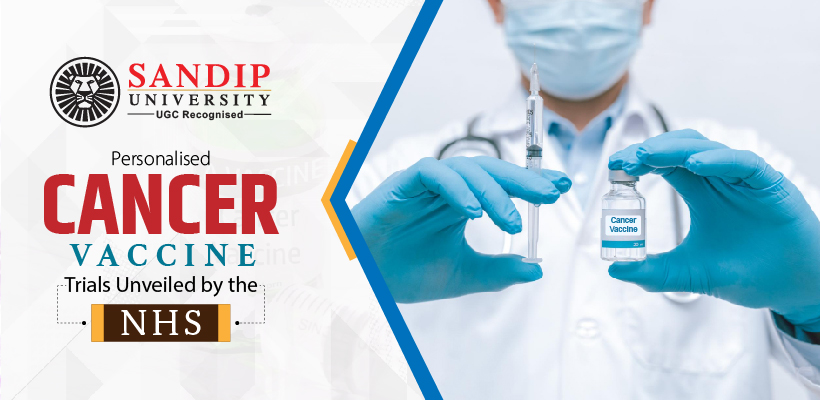Recently, the National Health Service (NHS) in the UK has made a huge leap in the field of the medical world. Clinical studies have provided the new platform for the development of personalised cancer vaccines. This could be a significant breakthrough in the field of oncology. The world’s most threatened disease, called cancer, can get a new pavement but is also challenging for scientists and health workers. Unlike others, they are developed to adapt the genetics of patients and to find out the reason behind the cancer.
These vaccines attack the cancer cell by activating the immune system in the patient. This targeted treatment helps in improvement in results, reduces side effects, and prevents relapse of cancer for a long time. Some of the best pharmaceutical science colleges in Maharashtra are partnering with top pharmaceutical companies to facilitate groundbreaking research in personalised cancer vaccines.
Cancer Research and Vaccine Trials by the NHS
The NHS has found the first case to treat a cancer patient with the personalised cancer vaccine in England. This was part of a clinical trial run by NHS England’s cancer vaccine launch pad (CVLP). Due to this novel and groundbreaking trial on personalised cancer vaccines, patients across the world will get fast-track treatment, which could save their lives.
The NHS CVLP, which works with Genomics England, aims to make it easier for people to get into mRNA-based personalised cancer vaccine studies and speed up the development of these new vaccines as a possible treatment.
30 hospitals across England have already signed up, the initiative is working closely with the drug business to include patients with a wide range of cancer types. NHS trusts that are taking part will get cancer tissue samples and blood tests from patients who give their permission. They will then send these patients to the nearest site to sign up for the study. BioNTech and Genentech worked together to make the vaccines. They are meant to get the immune system to find and kill any cancer cells that are still alive. This could stop cancer from coming back after surgery on the original tumour.
In 2023, the UK government and the biotechnology company BioNTech agreed to work together to make precision cancer immunotherapies available to up to 10,000 patients by 2030. In the UK, clinical trials are currently going on, and the NHS CVLP is playing a big role by signing up eligible people. These personalised cancer medicines could end the way oncology has been done in the past.
Eligibility of Patient for Clinical Trial
The NHS team will scrutinise and finalise the list based on patient history and current treatment going on. The people with ongoing cancer treatment diagnosed for the first time with cancer and patients who have shown relapse are eligible for cancer vaccine trials.
Patients who are less likely to have a relapse of cancer are not eligible for this trial. The NHA will ask the patients with good health so that they could join CVLP. If they give consent, the NHA team will check their eligibility for trial and will forward the list for further clinical studies. NHS’s existing patient data, extra tissue, and blood samples are used for scrutinising the final list of patients who can fit for the personalised cancer vaccine trial.
Currently, CVLP is growing and gaining lots of attention. In the near future, the CVLP will accommodate more and more trusts of the NHS in the next few years. This will expand the research in the development of personalised cancer vaccines in different types of cancers.
The NHS cancer vaccine launch pad has provided a new platform for patients’ hopes as it has changed the way to fight against cancer. This new launch involves treatment of cancer patients in collaboration with giant pharmaceutical companies like BioNTech and Genentech. This launch pad is based on treatment with cutting-edge mRNA technology with complex structures.
Personalised cancer vaccines will be healthcare professionals and scientists’ responsibility, as they have made significant progress in the pharmaceutical industry by collaborating and developing innovative ideas. The best choice for treatment of cancer if this clinical trial becomes successful. The expected outcome is to stop the recurrence and to give the better chance of survival. Healthcare professionals and scientists paved the big step in pharmaceutical industries by working together and moving forward in a timely manner with new ideas. This clinical launch pad will surely be the weapon for precise treatment of cancer tailored to patients’ needs in a timely manner.
Side Effects of Vaccine Against Cancer
As we all know, the cancer treatments used nowadays are more prone to side effects. Burt cancer vaccines, on the other hand, are well tolerated with very few side effects as compared to others. Cancer vaccines can cause the immune system to react with the treatment. Common side effects are flu-like symptoms like fever, chills, tiredness, and headaches.
Some patients may have myalgia (muscle pain), joint aches, and back pain. It is important to note that these reactions are usually mild and short-lived, and they usually go away on their own. However, patients should be aware of possible side effects like prolonged fatigue and talk to their healthcare provider about any symptoms that are worrying. Overall, the benefits of cancer vaccines in targeting specific cancer proteins usually outweigh the risks of side effects for most patients.
Conclusion
This treatment of personalised cancer vaccines is all set to revolutionise cancer prevention in coming years. There are many top pharmaceutical science colleges in Nashik that are training coming generations of pharmaceutical scientists that can further build on this line of treatment. Hopefully, this treatment will be a widespread reality soon so that many more people can be saved from this deadly disease.

